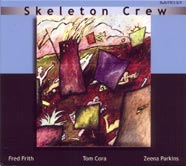Skeleton Crew
Learn To Talk/The Country Of Blinds
(Fred Records/ReR)
We could discuss for a long time about the first "American"
album recorded by Fred Frith - and a lot longer about whether such an album
indeed exists. Even when taking into consideration the "American"
"pronunciation" of the rock trio Massacre, I've always considered
the recently re-released Cheap At Half The Price as being Fred Frith's first
"American" album - and Skeleton Crew as his first "American"
band.
On
their debut album, Learn To Talk (1984), Skeleton Crew consisted of Fred Frith
and Tom Cora: a vibrant, multi-instrumental duo (Cora: cello, electric bass,
drums, a Casio keyboard and vocals; Frith: guitar, six-string electric bass,
violin, Casio, piano, drums and vocals). A very fast reaction time which demonstrated
their confidence with the practice of improvisation, most tracks on the brief
side, a spirit in a sense quite near to the "new-wave" and which
easily showed its ties with the protest spirit of folk music, a plurality
of forms which was only logical when taking into consideration the variety
of their background, highly ingenious arrangements, a "contemporary"
use of pre-recorded voices: "communicative, with depth", to use
a fast formula. Instrumental tracks which could be quite complex (Que Viva/Onward
And Upwards), songs that could be ironic (Learn To Talk, It's Fine), dramatic
(The Way Things Fall (Back Apart)), sad (Factory Song). Frith played as his
per usual, but it was the late Tom Cora who was a revelation for me at the
time of the album's original release. Here we also have four added tracks,
nor indispensable but not too bad, either.
Two
years later, The Country Of Blinds saw Skeleton Crew become a trio with the
nice addition of Zeena Parkins (organ, electric harp, accordion, drums, vocals),
while the production by former Henry Cow Tim Hodgkinson gave the album a certain
"family air". Compared to its predecessor, the new album had maybe
a more precise target, but in my opinion this was achieved by limiting the
palette of possibilities (maybe a truism?). We had more "European echoes"
(something from Art Bears, a pinch of News From Babel, also some tense nuances
quite typical of The Work) which the production style made even more apparent.
Arrangements were very good, but maybe a bit on the "conventional"
("predictable" definitely being the wrong word here) side. Communicative
songs on side one, instruments to the fore on side two. Here we have six bonus
tracks: they are really not too bad, but sometimes (Safety In Numbers, Second
Rate, Hasta La Victoria) a certain air of "angry new-wavers" is
a bit too much.
Let's
have a look at the re-release. Strange as it may sound, a brief instrumental
track originally on the second album (Money Crack) is nowhere to be found.
But the real absurdity is that there are no lyrics! On the first album they
had not been included (not in my copy, at least), and for years I dreamed
of the possibility to add the missing pieces to the bits I had managed to
get; the second album had a nice, heavy sheet with the lyrics. So I ask: what
the heck is the purpose of a "definitive edition... with no lyrics"?
The remastering is not bad, even if the A/B of vinyl vs. digital saw analogue
make mincemeat of digital: my LP had more level (!), more highs (!) and even
less compression (!), especially in the case of the first album; but since
the CD player I used was not my usual good one, and since my cartridge is
not too bad, I'll leave this topic to be decided later.
Beppe
Colli
©
Beppe Colli 2006
CloudsandClocks.net
| Feb. 3, 2006











